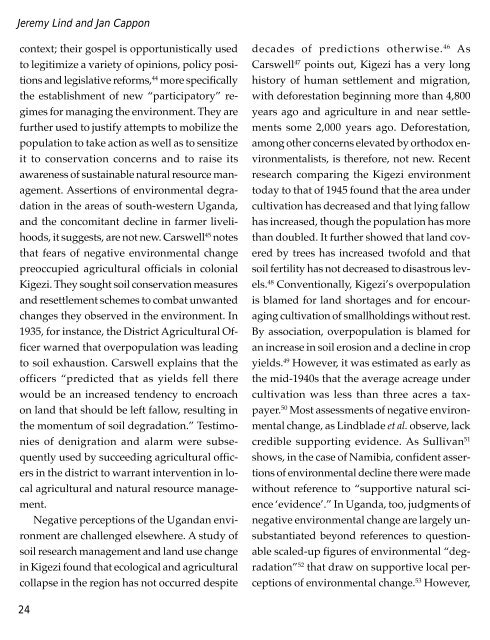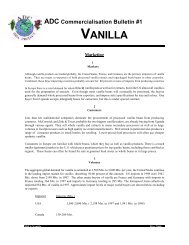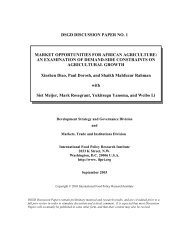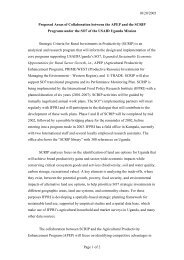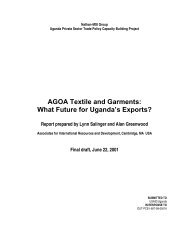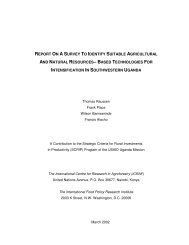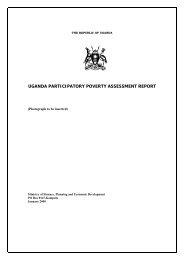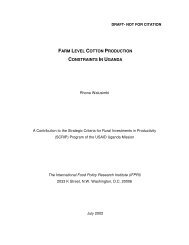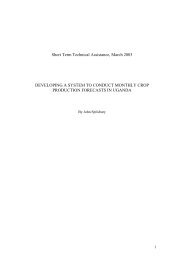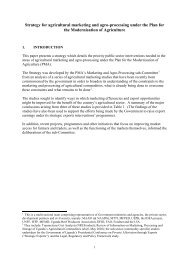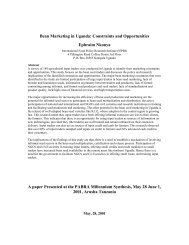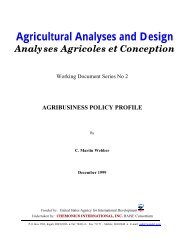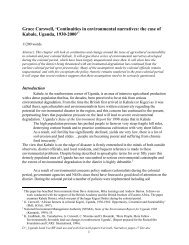Decentralisation in Uganda Rhetoric-Chapter3. - Foodnet
Decentralisation in Uganda Rhetoric-Chapter3. - Foodnet
Decentralisation in Uganda Rhetoric-Chapter3. - Foodnet
You also want an ePaper? Increase the reach of your titles
YUMPU automatically turns print PDFs into web optimized ePapers that Google loves.
Jeremy L<strong>in</strong>d and Jan Cappon<br />
context; their gospel is opportunistically used<br />
to legitimize a variety of op<strong>in</strong>ions, policy positions<br />
and legislative reforms, 44 more specifically<br />
the establishment of new “participatory” regimes<br />
for manag<strong>in</strong>g the environment. They are<br />
further used to justify attempts to mobilize the<br />
population to take action as well as to sensitize<br />
it to conservation concerns and to raise its<br />
awareness of susta<strong>in</strong>able natural resource management.<br />
Assertions of environmental degradation<br />
<strong>in</strong> the areas of south-western <strong>Uganda</strong>,<br />
and the concomitant decl<strong>in</strong>e <strong>in</strong> farmer livelihoods,<br />
it suggests, are not new. Carswell45 notes<br />
that fears of negative environmental change<br />
preoccupied agricultural officials <strong>in</strong> colonial<br />
Kigezi. They sought soil conservation measures<br />
and resettlement schemes to combat unwanted<br />
changes they observed <strong>in</strong> the environment. In<br />
1935, for <strong>in</strong>stance, the District Agricultural Officer<br />
warned that overpopulation was lead<strong>in</strong>g<br />
to soil exhaustion. Carswell expla<strong>in</strong>s that the<br />
officers “predicted that as yields fell there<br />
would be an <strong>in</strong>creased tendency to encroach<br />
on land that should be left fallow, result<strong>in</strong>g <strong>in</strong><br />
the momentum of soil degradation.” Testimonies<br />
of denigration and alarm were subsequently<br />
used by succeed<strong>in</strong>g agricultural officers<br />
<strong>in</strong> the district to warrant <strong>in</strong>tervention <strong>in</strong> local<br />
agricultural and natural resource management.<br />
Negative perceptions of the <strong>Uganda</strong>n environment<br />
are challenged elsewhere. A study of<br />
soil research management and land use change<br />
<strong>in</strong> Kigezi found that ecological and agricultural<br />
collapse <strong>in</strong> the region has not occurred despite<br />
24<br />
decades of predictions otherwise. 46 As<br />
Carswell47 po<strong>in</strong>ts out, Kigezi has a very long<br />
history of human settlement and migration,<br />
with deforestation beg<strong>in</strong>n<strong>in</strong>g more than 4,800<br />
years ago and agriculture <strong>in</strong> and near settlements<br />
some 2,000 years ago. Deforestation,<br />
among other concerns elevated by orthodox environmentalists,<br />
is therefore, not new. Recent<br />
research compar<strong>in</strong>g the Kigezi environment<br />
today to that of 1945 found that the area under<br />
cultivation has decreased and that ly<strong>in</strong>g fallow<br />
has <strong>in</strong>creased, though the population has more<br />
than doubled. It further showed that land covered<br />
by trees has <strong>in</strong>creased twofold and that<br />
soil fertility has not decreased to disastrous levels.<br />
48 Conventionally, Kigezi’s overpopulation<br />
is blamed for land shortages and for encourag<strong>in</strong>g<br />
cultivation of smallhold<strong>in</strong>gs without rest.<br />
By association, overpopulation is blamed for<br />
an <strong>in</strong>crease <strong>in</strong> soil erosion and a decl<strong>in</strong>e <strong>in</strong> crop<br />
yields. 49 However, it was estimated as early as<br />
the mid-1940s that the average acreage under<br />
cultivation was less than three acres a taxpayer.<br />
50 Most assessments of negative environmental<br />
change, as L<strong>in</strong>dblade et al. observe, lack<br />
credible support<strong>in</strong>g evidence. As Sullivan51 shows, <strong>in</strong> the case of Namibia, confident assertions<br />
of environmental decl<strong>in</strong>e there were made<br />
without reference to “supportive natural science<br />
‘evidence’.” In <strong>Uganda</strong>, too, judgments of<br />
negative environmental change are largely unsubstantiated<br />
beyond references to questionable<br />
scaled-up figures of environmental “degradation”<br />
52 that draw on supportive local perceptions<br />
of environmental change. 53 However,


